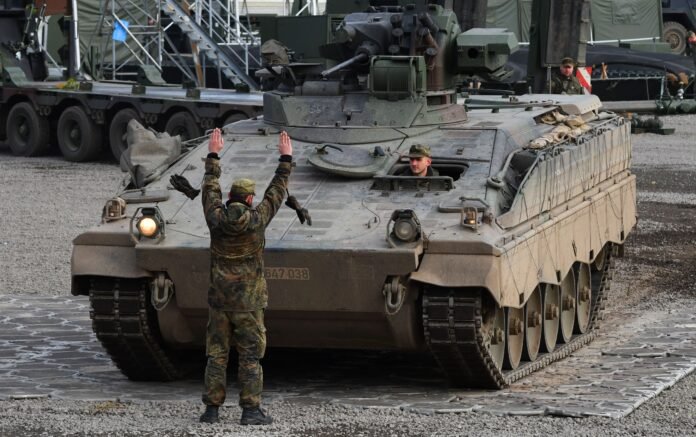In a significant policy shift, German Chancellor Friedrich Merz has announced that his government will no longer publicly disclose details of military aid to Ukraine. The decision, according to Merz, is designed to protect operational security and maintain strategic ambiguity at a time when Russia continues to escalate hostilities against Kyiv.
Transparency Ends, But Support Stays
Merz assured that Germany’s commitment to Ukraine remains “unwavering,” stressing that Berlin continues to provide financial, humanitarian, and military support. What has changed, however, is the public reporting system. For the past two years, the German government had periodically released details about weapons shipments, ranging from air defense systems to armored vehicles. Now, such disclosures will cease.
He clarified that decisions regarding arms deliveries will still be coordinated within the Federal Cabinet and aligned with international partners, but they will not be shared with the media or the public. According to the Chancellor, strategic secrecy ensures that Russia is not tipped off about the scale or timing of upcoming deliveries.
Protecting Operational Information
German defense officials have argued that openly disclosing shipments could provide valuable intelligence to Russia. Information about the type, quantity, or timeline of deliveries could potentially be exploited on the battlefield. By restricting this data, Berlin aims to deny Moscow a tactical advantage while simultaneously keeping Ukraine’s defenses unpredictable.
This policy marks a return to discretion, reminiscent of the early phases of the war when many NATO members refrained from discussing arms supplies openly. Merz emphasized that “security is built not only on strength but also on uncertainty for the opponent.”
The Taurus Missile Debate
At the center of speculation is the Taurus cruise missile system, a long-range precision weapon capable of striking targets over 500 kilometers away. Ukraine has persistently requested these missiles, arguing they would provide a crucial edge against Russia’s deep positions.

Merz, however, refused to confirm or deny whether Taurus systems will be sent, highlighting that the new secrecy rule specifically prevents public discussion of such matters. Military experts believe this ambiguity serves two purposes: deterring Russia by keeping it guessing and avoiding domestic political controversies that could arise from openly debating sensitive weapons transfers.
Political Reactions and Disagreements
The decision has sparked debate within Germany’s political establishment. Some government officials, particularly from the opposition, argue that the lack of transparency undermines democratic accountability. They contend that citizens have the right to know how their country is engaging in one of the most consequential conflicts in modern Europe.
Meanwhile, Finance Minister Lars Klingbeil downplayed Merz’s announcement, suggesting that this is not a dramatic policy change but rather a continuation of what has quietly been practiced. His remarks underscore internal differences in how the government wants to present its Ukraine strategy to the public.
NATO and EU Implications
Germany’s announcement could influence how other NATO and EU countries handle communication about arms deliveries. Some European states, like Poland and the Baltic nations, continue to highlight their military support to Ukraine as a show of solidarity. Others, however, may see merit in adopting Germany’s approach of “quiet assistance.”
Diplomatic observers note that this shift could improve military efficiency but might also complicate efforts to maintain public backing for aid, especially as war fatigue grows across Europe.
Balancing Secrecy and Accountability
While strategic ambiguity strengthens Ukraine’s military edge, it also raises important questions about oversight. Critics warn that shielding such information from public view could erode trust in government, particularly if disagreements arise over how much aid is actually being provided.
Chancellor Merz acknowledged these concerns but insisted that the current situation demands prioritizing security over transparency. He stressed that Germany remains one of the leading contributors to Ukraine’s defense, with billions committed in both military and humanitarian sectors.
As the war grinds on, Germany’s role as a key European power will remain under scrutiny. Whether this policy shift improves Ukraine’s battlefield prospects or fuels political debate at home remains to be seen. What is certain is that Germany is walking a tightrope—trying to ensure maximum support for Kyiv without compromising operational security or domestic stability.
For Ukraine, the new stance from Berlin is a double-edged sword: while secrecy may keep Russia guessing, it also means Kyiv loses a powerful tool of public diplomacy—clear evidence of allied backing.
ALSO READ: Holi 2025: Auspicious Date, Muhurat, Rituals & Significance of the Festival












